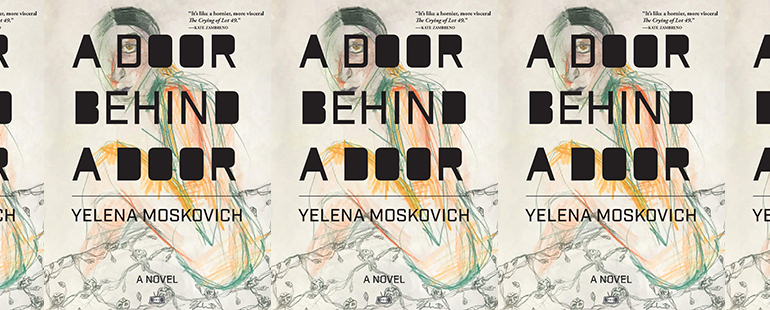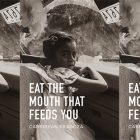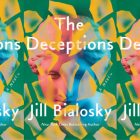Bad People and Bad Dreams in A Door Behind a Door

A Door Behind a Door
Yelena Moskovich
Two Dollar Radio | May 18, 2021
Yelena Moskovich’s third novel, A Door Behind a Door, delivers precisely what its enigmatic title hints at: the story of a hindered passage, a moving forward that is blocked by the inconceivable, the absurd, and the repetitive. Like a David Lynch film, A Door Behind a Door is loose, dreamy, and symbol-packed, employing themes as a series of pegs to hang from, and, in the end, leaving the reader with the sensation that they’ve just stepped off a ride. The ride begins with a crime committed years ago in the Soviet building complex where the protagonist Olga grew up before immigrating to America in the early 1990s. Olga describes the crime committed by her neighbor, Nikolai, a teenager also living in the building, who murdered a kind-hearted elderly widowed neighbor., The victim radiated positivity and selflessness—antithetical to the remaining antisocial, violent characters living in the building.
Though Olga is now an adult, living in Milwaukee and far removed from her childhood environment, the memory of the crime continues to fill her with “anachronistic dread.” Nikolai’s victim is a picture of good that stands in direct contrast to his evil—he is a boy who senselessly stabbed her, not once, but three times, the novel stresses. Olga, it is suggested at first, is also of the “good” camp—distinguishing herself from Nikolai, she stresses that she has never dreamed of stabbing another person. She leads a happy life, in love with her girlfriend, whom she refers to as an “angel”—another stalwart of goodness. The weighty theme of good and evil—squeaky-clean souls and those marred by an inherent original sin, the cursed and suffering Biblical Cains—is prominent in A Door Behind a Door. Like the dual-natured characters of a Lynch movie, thrilling and horrifying for containing extreme and antithetical natures, Moskovich’s characters also morph and become nightmare versions of themselves. The loose and non-linear style of the novel makes it unclear if this transformation is real or indeed only a bad dream.
Though Olga is initially repulsed by Nikolai—the “bad man”—when he calls her out of the blue one night and reveals he is also now living in Milwaukee, something changes. He informs Olga that she must collaborate with him if she wishes to rescue her estranged brother. Her beloved, docile sibling—once victimized by school bullies—stands accused of stabbing a woman to death himself and is being held in some form of purgatory or jail. Olga is shocked; it seems her brother has potentially transformed into a “bad man” as well. Olga attempts to puzzle through what her brother has done, and in her quest, she meets a woman who employs a curious method of converting persons and giving them new personalities—possibly turning formerly good souls into bad: having them count to three in French while pressing their thumb and forefinger together. It appears that even Nikolai’s victim, the deceased window, may have been reborn through this process and is now roaming Olga’s city as a woman named Sally, a figure in underground crime circles who bears no resemblance to the formerly kind-hearted widow.
The resurfacing of characters from Olga’s past in her new city speaks to the theme of immigration in the novel, of new homes and the passage from old to new—a passage that is perhaps not ever fully complete in the sense that the past cannot be shaken (Moskovich, like Olga, immigrated from the Soviet Union to Wisconsin with her family in 1991). Olga speaks of an “air bubble between two continents”—of a life “split in two”—that she finds senseless to even attempt to explain or describe to her American girlfriend.
Yet Olga knows it is Nikolai, the convicted murderer, who is the person most likely to understand her state of in-betweeness, and that they therefore have a connection. Just as she can’t shake the memory of his crime, it appears she can’t shake him off. It’s both disturbing to her and also unclear how he has located her in Milwaukee. Perhaps, Olga thinks, her collaboration with Nikolai is a sign that she and he are more aligned than Olga wants to believe. In reference to Nikolai, she says, “[S]ometimes you can feel it when a person has the same twist in their heart as you,” which is so at odds with her initial effort to distance herself from the criminal and his actions. Is she more like her former neighbors than she would like to believe? Or is it fear that she is like them simply making her doubt her own nature?
The novel goes further to suggest that Olga and Nikolai eventually become doubles—amongst the other doubles in this novel, such as the two men who have stabbed women. After Olga performs the French number-counting finger ritual and presumably transforms, the novel in its final pages suggests she is now capable of wielding a knife, and may possibly have committed a crime. “Olga, what are you doing?!” an unnamed character exclaims—though perhaps she has only harmed herself with the weapon—“MY MOUTH IS POOLING WITH COLDNESS,” reads the following line. As such, she and Nikolai become fully entwined: she is not the binary-opposite “good” to his evil, not the woman incapable of stabbing.
Or, again, is it only a bad dream? Is Olga’s transformation just a nightmare? The Lynchean style of this narrative does not make clear the boundaries between internal and external worlds. Again, it’s impossible to tell. With no linear plot or clearly explained scenes and events, the novel offers clues and allows the reader to take pleasure in collecting symbols, noting patterns such as recurring themes, numbers, or the repeated titles of the short, lyrical sections that make up the novel. Ultimately, as the title suggests, opening doors only leads to more of the same. Indeed, Moskovich’s novel is like a spinning, revolving door—there is no single, winning interpretation. The fun, it seems, is in being spun.



